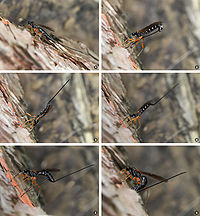- Oviposition
-
 The process of oviposition in Dolichomitus imperator: 1 Tapping with her antennae the wasp listens for the vibrations that indicate a host is present; 2 With the longer ovipositor, the Wasp drills a hole through the bark; 3 The wasp inserts the ovipositor into the cavity which contains the host larva; 4 Making corrections; 5 Depositing eggs; 6 Depositing eggs.
The process of oviposition in Dolichomitus imperator: 1 Tapping with her antennae the wasp listens for the vibrations that indicate a host is present; 2 With the longer ovipositor, the Wasp drills a hole through the bark; 3 The wasp inserts the ovipositor into the cavity which contains the host larva; 4 Making corrections; 5 Depositing eggs; 6 Depositing eggs.
Oviposition is the process of laying eggs by oviparous animals.
Some arthropods, for example, lay their eggs with an organ called the ovipositor[1].
Fish (excluding certain species of sharks), amphibians, reptiles, birds and monetremata also lay eggs.
A major issue for human health is the prevention of oviposition by malaria-bearing anopheles mosquitos. Suggested methods include using floating plants to cover the surface of bodies of stagnant water[2].
References
- ^ Sezen, Uzay. "Two ichneumon wasps competing to oviposit". http://www.vimeo.com/28911034. Retrieved 12 September 2011.
- ^ http://www.arbovirus.health.nsw.gov.au/areas/arbovirus/mosquit/freshwet.htm
Human physiology and endocrinology of sexual reproduction Menstrual and estrous cycle Gametogenesis Spermatogenesis (spermatogonium, spermatocyte, spermatid, sperm) · Oogenesis (oogonium, oocyte, ootid, ovum) · Germ cell (gonocyte, gamete)Human sexual behavior Sexual intercourse · Masturbation · Erection · Orgasm · Ejaculation · Insemination · Fertilisation/Fertility · Implantation · Pregnancy · Postpartum period · Mechanics of sexLife span Egg (biology) Reproductive endocrinology
and infertilityBreast Categories:- Reproductive system
- Biology stubs
Wikimedia Foundation. 2010.
